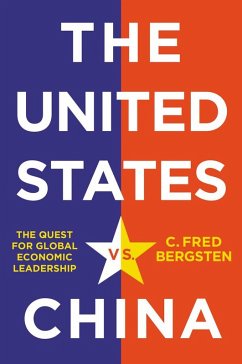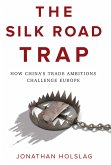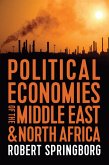Dieser Download kann aus rechtlichen Gründen nur mit Rechnungsadresse in A, B, BG, CY, CZ, D, DK, EW, E, FIN, F, GR, HR, H, IRL, I, LT, L, LR, M, NL, PL, P, R, S, SLO, SK ausgeliefert werden.

Wie Amerika und China um die Führungsrolle ringen
Der amerikanische Ökonom Fred Bergsten hatte im National Security Council an der amerikanischen China-Politik mitgewirkt und lange das Peterson Institute for International Economics in Washington geleitet. Es geht ihm um die Auswirkungen der Rivalität zwischen den beiden größten Wirtschaftsmächten und die künftige Gestaltung der Weltwirtschaft. Er warnt vor einer Strategie der Eindämmung und einem kalten Krieg der USA gegen China. Die chinesische Volkswirtschaft ist dafür zu groß und zu stark mit anderen Volkswirtschaften verflochten. Während die USA für 40 Länder der wichtigste Handelspartner sind, ist es China für 60. Neben Wettbewerb zwischen beiden Ländern muss es auch Kooperation geben, wenn globale Probleme gelöst werden sollen. Das ist offensichtlich beim CO2-Problem, wo China der größte Emittent ist, gilt aber auch bei Pandemien oder Wirtschaftskrisen. Nach Bergsten konnte die Weltwirtschaftskrise der Zwischenkriegszeit deshalb einen Beitrag zum Zweiten Weltkrieg leisten, weil die absteigende Wirtschaftsmacht Großbritannien und die aufsteigenden USA nicht gemeinsam Abwertungswettläufe verhindert und den Freihandel geschützt haben, weil es keinen Kreditgeber der letzten Instanz gab, weil die amerikanische Containment- und Embargo-Politik gegen Japan in Pearl Habor gescheitert ist.
Es gibt globale öffentliche Güter, die die USA zeitweise als Hegemonialmacht und oft in Zusammenarbeit mit ihrer hegemonialen Koalition beschafft haben, zu der vor allem die westeuropäischen Länder und Japan gehören. Hoffnung vermittelt, dass es schon mal zu faktischer Kooperation der USA und China gekommen ist: bei der Asienkrise Ende des 20. Jahrhunderts, wo die USA über den Internationalen Währungsfonds (IWF) sich um Stabilität bemühten und China auf eine Abwertung des Yuans verzichtete, oder bei der großen Finanzkrise am Anfang des 21. Jahrhunderts, wo die Federal Reserve monetär und der chinesische Staat durch einen fiskalischen Stimulus die Weltwirtschaft stützten. Auch künftig muss die Kooperation zwischen beiden Mächten nicht explizit sein. Ein implizites Einverständnis und informelle Zusammenarbeit könnten in Anbetracht der chinesischen Distanz zum Recht und der Präferenz für nationale Souveränität besser sein. Bergsten hält neue Regeln für nötig, um dem chinesischen Gewicht in der Weltwirtschaft auch beim IWF Ausdruck zu verleihen. Er ist vorsichtig optimistisch, dass die offene Weltwirtschaft auch ohne amerikanische Führung funktionieren könnte, wenn Europäern und Japanern die Kooperation mit den Chinesen gelingt und ein Ersatz für den Streitschlichtungsmechanismus der Welthandelsorganisation gefunden wird.
China hat von der Einbettung in die westlich geprägte Weltwirtschaft gewaltig profitiert. Seine Volkswirtschaft wuchs in 40 Jahren bis 2018 um den Faktor 37, der Lebensstandard der Chinesen um den Faktor 26, der Anteil Chinas an der Weltwirtschaft stieg von 2 auf 16 Prozent. China hat sich nicht immer an die Regeln gehalten: weder was die zulässigen Subventionen für Staatsbetriebe angeht noch beim Schutz von Patenten. Für den China-Schock auf dem amerikanischen Arbeitsmarkt macht Bergsten die zeitweise starke Unterbewertung (bis zu 40 Prozent) des Yuans verantwortlich. Aber das ist vorbei. Auch die USA haben sich nicht immer an die WTO-Regeln gehalten und treiben manchmal eine protektionistische Politik.
Obwohl die Akzeptanz einer offenen Weltwirtschaft in den USA als Spätfolge des China-Schocks erodiert ist, betont Bergsten, dass Amerika ebenso wie China von Freihandel und Globalisierung profitiert hat. Nach Bergsten überwiegen die Vorteile der Führungsposition die Kosten im Verhältnis 50 zu 1. Weil die Vorteile der breiten Bevölkerung zugutekommen, die Nachteile eine konzentrierte Minderheit treffen, die nicht genügend kompensiert wird, sind die politischen Kosten der Führung in einer offenen Weltwirtschaft hoch. Die Kosten protektionistischer Alternativen sind es auch. Nach Bergsten kostete jeder von Trump gerettete Stahlarbeiter-Job rund 900 000 Dollar. Für die Haupteffekte der amerikanischen Führungsposition hält Bergsten einen chronisch überbewerteten Dollar und eine negative Leistungsbilanz, was man für ein Privileg oder eine Bürde halten kann.
Voraussetzung für eine Führungsrolle ist wirtschaftliche Stärke. China holt auf, wenn es auch in manchen Bereichen noch zurückliegt. Die Arbeitsproduktivität erreicht erst ein Siebtel des amerikanischen Wertes. Die demographische Lage ist in China viel schlechter als in den USA. Die chinesische Wirtschaft ist bei Berücksichtigung der Kaufkraft schon größer als die amerikanische, China ist auch schon größter Exporteur der Welt, hat die größten Devisenreserven, aber liegt bei Halbleitern und bei der Entwicklung seiner Finanzmärkte zurück. China hat keine wirtschaftlich starken Verbündeten: Wenn man China mit der von den USA geführten Koalition vergleicht, dann kann China noch lange nicht an deren Wirtschaftskraft heranreichen. Das abnehmende Gewicht der Außenwirtschaft für die chinesische Volkswirtschaft schwächt den Anreiz, Verantwortung für die weltwirtschaftliche Ordnung zu übernehmen.
Der Leser des Buches kann von der Spannung zwischen der Notwendigkeit der Zusammenarbeit und dem wiederkehrenden Verweis auf die Hindernisse frustriert werden. Bergstens zehn Empfehlungen illustrieren die Probleme, ohne dabei Optimismus zu rechtfertigen. ERICH WEEDE
Carl Fred Bergsten: The United States vs. China - The Quest for Global Economic Leadership, Polity Press, Medford MA 2022, 362 Seiten, 31 Euro.
Alle Rechte vorbehalten. © F.A.Z. GmbH, Frankfurt am Main
The New York Review of Books
"No matter where you sit on the China-engagement spectrum, you will find Bergsten's intelligent arguments of merit and practical use; whether you find yourself nodding in agreement and glad to be armed with such persuasive points, or furrowing your brow while attempting to formulate sound rebuttals, you'll come away with a more informed and nuanced view of options for the China-U.S. economic relationship."
Bookish Asia
"Americans may be uncomfortable with the lurch toward self-fulfilling Cold War thinking on China. But discomfort is not a plan. C. Fred Bergsten's seminal new book draws on his five decades of experience as a leading global economic thinker and doer to outline the most compelling alternative in the economic sphere yet put forward."
Lawrence H. Summers, former Secretary of the Treasury and President Emeritus of Harvard University
"Escalating tensions between the world's two largest economies have fueled concerns of a repeat of the 1930s disaster. Esteemed economist C. Fred Bergsten analyzes what's at stake and brilliantly outlines policy options to avoid these risks. A must-read for all of us, and particularly those in government today."
Carla A. Hills, Chair & CEO, Hills & Company International Consultants
"An outstanding work ... If the US and China ever find a way out of their current conflict, the balanced analysis and policy recommendations in this book will have played a fundamental role."
Barry Naughton, University of California, San Diego
"No one is better suited than Fred Bergsten to undertake this critical study of US-China economic competition. It will be the defining challenge of the 21st-century for both nations, and the prescriptions he lays down are well-suited to avoid a trade war neither side can win."
James Stavridis, Admiral, US Navy (retired), former Supreme Allied Commander of NATO, and Vice Chair of The Carlyle Group
"Fred Bergsten is one of the world's foremost experts on the global economy. His exceptional book offers a 21st Century complement to Charles Kindleberger's classic about international leadership and economic orders. Bergsten explains why the global economic system depends on an accommodation between the United States and China. He challenges the new Cold War thesis of condemning and containing China. Instead, he offers a work plan of cooperation and competition, conditioned upon reciprocity."
Robert B. Zoellick, Former President of the World Bank, US Trade Representative, and Deputy Secretary of State, and author of America in the World
"In this stimulating book, Fred Bergsten ponders the challenge for global economic leadership being waged by the U.S. and China now and in the coming decades. It is a powerful work, drawing on deep experience and insider knowledge."
David Bachman, University of Washington
"In his masterful opus, Fred Bergsten, a pioneer in the study of international economic policy coordination, explores the modus vivendi of the United States and China in the age of global leadership vacuum. He argues that liberal internationalism still serves the enlightened self-interest for both countries, as well as for the rest of the world. His vision is solidly anchored with geopolitical realism and pragmatic idealism."
Yoichi Funabashi
"Fred Bergsten, an experienced and influential economic policymaker, warns against a new Cold War between the US and China, and offers positive suggestions for managing a competitive cooperation."
Joseph Nye, Distinguished Service Professor at Harvard Kennedy School of Government and author of Do Morals Matter? Presidents and Foreign Policy from FDR to Trump
"Impressive book[...]."
The Critic
''Bergsten's book is important for its breadth of perspective and depth of knowledge.''
Vivek Arora, Finance & Development
"cogent and comprehensive"
Andrew Peaple, The Society of Professional Economists









